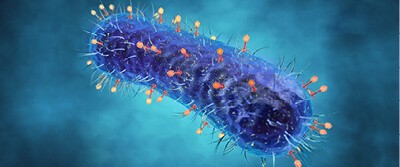Phages Hold Potential for Human Health Benefits

By Kylie Wolfe
Researchers at Monash University in Melbourne, Australia, have uncovered a potentially beneficial link between bacteriophages and the human body. Historically, most science courses have taught that bacteriophages (or phages for short) do not interact with eukaryotic cells, but there is new evidence that suggests they may interact, and in a positive way.
Phages in the Body
Phages are viruses that infect and replicate inside a bacterium. These viruses can be found anywhere that bacteria exists, including inside plants and animals, in the ocean, and in soil. The new Monash study demonstrates that these viruses can also live and interact within the human body.
Although some of the cells in the study were cancerous, which could produce different results than a set of exclusively normal cells, researchers estimated that almost 300 billion phages may be absorbed daily through our intestines based on the rate they observed in the lab. Phages stick to the lining of the body’s protective mucus layers, which allows the phages to attack more bacteria, protect underlying cells, and be absorbed. Epithelial cells in the intestines, lungs, and capillaries take up phages in vesicles before transporting them throughout the inside of the body, where they can cause an immune response.
Promising Findings
Researchers have also found that some phages can bind to cells in mice, thereby reducing the growth and spread of cancerous tumors. Moreover, injected phages cause T cell proliferation to decrease, making the mouse’s immune system more accepting to transplanted tissue. Future application of this finding to the medical field has great potential.
Scientists also believe that the regular uptake and release of phages, which supports their steady existence internally, could potentially help to regulate a human’s immune response and other physiological aspects by alerting the immune system to the presence of harmful bacteria. But these promising findings are still preliminary, because while phage therapy has shown some success, it has not yet advanced to become a reliable treatment method.
Discussion Questions
- What other physical aspects of the human body (both internal and external) contribute to protecting us from injuries and illnesses? How does this inform your understanding of how phages work within the body?
- In what ways do you fight bacteria on a daily basis? Discuss not only the physical actions you take, but the internal reactions your body might have.
Vocabulary
- Bacteriophage
- Eukaryotic Cell
- Immune System
- Vesicle
- T Cell
